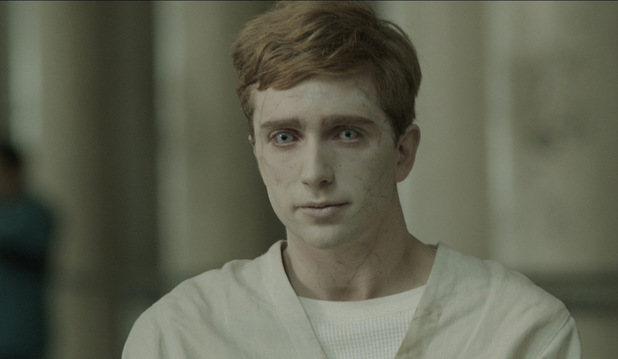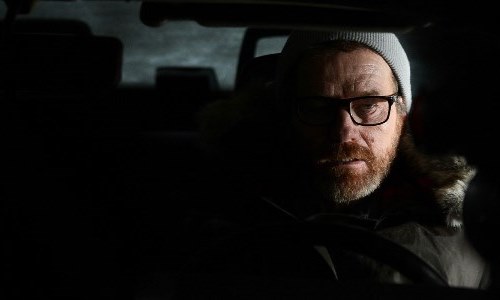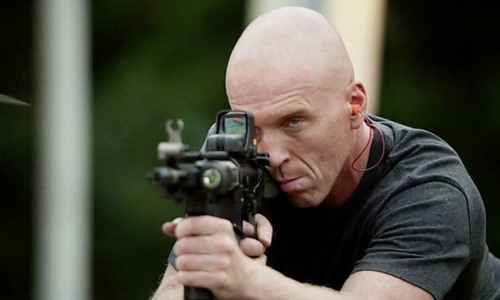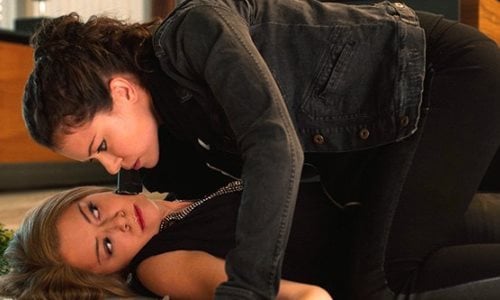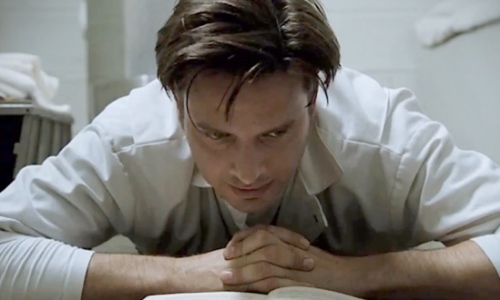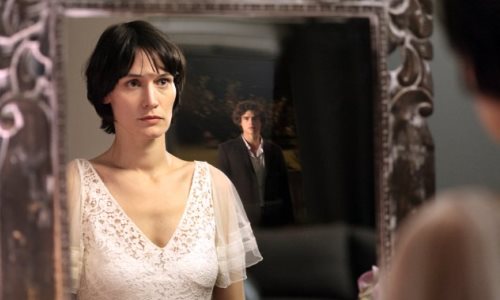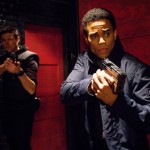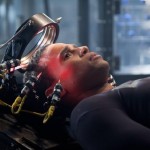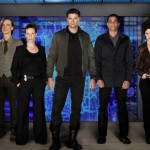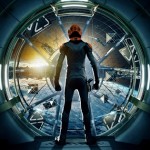Well, 2013 sure was a fantastic year for movie and tv buffs, wasn’t it?
I’ll be publishing my list of the best films of the year next week, but for now, here are my picks for the best shows television had to offer. If I included every really good program I saw this year, this list would be far too long, so I’ve instead narrowed it down to the seven shows I thought stood a small notch above the rest and that I still find myself thinking about. Honestly, if you were to ask me tomorrow, I could easily swap any of these out with another show. That’s how good this year was for television. For starters, though, here are more than a handful of honorable mentions, to make sure I don’t forget anything:
The Americans: This FX political drama about a husband and wife in the ‘80s who are actually Russian sleeper agents didn’t quite have that extra oomph I was looking for, so I can’t put it near the top of my list, but all the pieces are in place for a really solid second season. Not only does it have plenty of intrigue (and a wig budget that’s probably off the charts), it’s also one of the better examinations of marriage on the small screen.
Borgen: Full disclosure—I’ve only finished the first of three seasons. I can already call this Danish show about a female prime minister the best political program since The West Wing, though. It does a fantastic job of depicting the professional and personal obstacles that come with leading a nation.
Broadchurch: This crime drama aired on BBC America and stood out because rather than spending most of its time on the central murder investigation, it took the time to explore how grief can affect families and a small community.
Eastbound & Down: I hate-watched this HBO comedy for three seasons. It always struck me that the people involved were enjoying Kenny Powers’ depravity and lewd behavior a bit too much, like they were only saying he was an awful guy but didn’t actually believe it. But the final season actually deserves mention alongside Breaking Bad as a brilliant depiction of moral emptiness; they finally found just the right tone of satire.
In The Flesh: This BBC zombie show will hopefully find a U.S. following once it’s released on DVD. It’s a brilliant premise—after a zombie uprising, a cure allows them to be rehabilitated and re-integrated into society—that uses zombification as a means to explore prejudice, guilt, and forgiveness. Great stuff.
It’s Always Sunny In Philadelphia: The long-running FX comedy had one of its best seasons in years because, like Eastbound & Down, it got back to explicitly reminding the audience that its characters are truly awful people.
Key and Peele: Still the funniest, smartest sketch comedy show in years.
Masters of Sex: The promising pilot was just the first of 12 fantastic episodes that explored how people will use just about any excuse, including science, to justify their behavior. It’s one of the most sex-positive shows on television, but it doesn’t shy away from recognizing that just becomes something comes naturally doesn’t mean it’s always good. Honestly, not a whole lot happened in the grand scheme of the season, but that’s a good thing—the show isn’t afraid to let its characters and relationships breathe.
Top of the Lake: This New Zealand-set miniseries from acclaimed director Jane Campion stars Elisabeth Moss as a detective investigating the disappearance of a 12-year-old girl. This chillingly twisted exploration of crime and misogyny boasts beautiful visuals and some powerhouse performances.
All of those shows are worth checking out (with the possible exception of Eastbound & Down, since I’m not sure I’d recommend sitting through the first three seasons to get to the fourth one). I didn’t even mention Orange Is The New Black and Parks and Recreation and Mad Men and Girls and South Park and oh, just forget it. There’s so much great television out there now you really don’t have any excuse for watching crap.
Which is why you should really take the following list with a grain of salt. The following seven shows are just what really stood out to me at the time of this writing. My picks for the best shows of 2013, in alphabetical order, are:
Breaking Bad:
I’ve already written about this show a lot for Patheos, suffice it to say that Breaking Bad’s final half-season was some of the most surprising, engaging and intense hours of television I’ve ever had the privilege to sit through. Vince Gilligan brought the story of teacher-turned-meth-cook Walter White to a conclusion that nobody saw coming, and not before throwing more than a few gut-punches in there for good measure.
With luck, the success of Breaking Bad will open the door for new shows to explore the crevasses of the human soul in long-form fashion. Whether you think Walter White was always Heisenberg or just created him at some point along the way, and whether you interpret the ending as one of redemption or damnation, Breaking Bad is perhaps the best example of a show exploring how actions have consequences. Every event is surprising yet also feels stunningly inevitable. I have a lot of mixed feelings about the finale, but I think it’s an ending that’s going to be discussed for a long time to come, and even my misgivings aren’t enough to taint what came before. I’m hard-pressed to think of an episode of television that thrilled me this year as much as “Ozymandias”… unless we’re counting other episodes of Breaking Bad.
Enlightened:
The first season was a bit rough, but the final season of Mike White and Laura Dern’s HBO comedy was perfect. Every episode was tight, involving, and pushed the story forward in unexpected and satisfying ways. For those of you that don’t know, this criminally under-seen gem followed Amy Jellicoe (Dern), a corporate executive who has a breakdown, goes to rehab, and comes back determined to make the world a better place. But how do you change the minds of people who don’t think they need changing?
Enlightened worked because it loved its characters, no matter how flawed. Amy is one of most irritating, annoying protagonists I’ve ever encountered, yet she’s just trying to do the right thing and help other people do it, too. The second season finds her trying to find the best way to reveal her company’s dirty secrets without damaging her relationships, and things don’t always go according to plan. People are messy. Institutions are messy. And change, real change, can be the messiest thing of all. When the credits rolled on the final episode, I wanted to stand up and cheer. Enlightened isn’t just a good show—it made me want to be a better person.
Hannibal:
I was skeptical when I heard that NBC was making a television show based around one of the most iconic villains in film and crime fiction, but this take on the character from showrunner Bryan Fuller is one of the most layered and nuanced portrayals yet. Set before the events of Red Dragon, the show follows FBI investigator Will Graham (Hugh Dancy) as he investigates a series of murders alongside psychiatrist (and closet psychopath) Hannibal Lecter (Mads Mikkelsen). Graham is Lecter’s polar opposite, capable of feeling pure empathy and understanding exactly what his suspects were thinking, a characteristic that makes him invaluable at solving crimes but also threatens his own sanity.
Even more than the fantastic performances and stunning visuals, I was drawn to the show’s exploration of violence as something visceral and, at times, attractive. It subtly interrogates the audience and invites us to question our own culpability. If prolonged exposure to violence and death affects Will, can it not also affect us? Is seeing violence onscreen cathartic or desensitizing? At what point do we become like the killers we’re watching? Not only is it superbly crafted, it’s also very self-aware, and Fuller seems genuinely interested in depicting violence/gore in an “appropriate” way, whatever that may be.
Homeland:
A lot of critics were unfairly harsh towards the third season of Homeland, and to be fair, it did appear to get off to a rocky start. Carrie Mathison (Claire Danes) spent most of the first few episodes stuck in rehab, forced to sit by and watch while the world dealt with the aftermath of the Season 2 finale and Saul (Mandy Patinkin) struggled to get used to his new job as temporary head of the CIA. But that was soon revealed to be a piece in a much larger puzzle, and by the time Nicholas Brody (Damian Lewis) finally became a larger part of the season-long plot, the fat had been trimmed and things were moving at a breakneck pace.
This year, the show successfully brought the story of Carrie’s three-season obsession with Brody to a satisfying conclusion. The great thing about Homeland is that while the plot can occasionally get pretty ridiculous, it’s always founded on real-life concerns: the complexities of the War on Terror, the traumatizing effects of armed conflict, and the dehumanizing nature of large institutions. It’s one of most politically radical shows on television, embedding a pacifistic streak underneath the explosions and espionage, and acknowledging that sometimes the only individuals who can love broken people are other broken people. I spent the whole season podcasting about every episode, and there turned out to be a lot to discuss.
Orphan Black:
Yes, the hype is deserved. This Canadian science-fiction program aired on BBC America here in the United States, and it’s the perfect import for people who think Downton Abbey is just too stuffy for them. Tatiana Maslany stars as, well, several people, since in the very first episode she encounters someone who looks just like her, and could very well be a clone. Mistaken-identity hijinks and evil mad science schemes ensue. As science continues to advance, we may find ourselves encountering issues this show touches on more frequently. What defines a human? Does man-made life have a soul? To what extent is genetic material our property? Don’t worry, though, this isn’t a very intellectual show (at least not yet). It’s pure, B-movie fun, and an absolute blast. I can’t remember the last time I binge-watched a show so fast.
Rectify:
Sundance Channel’s first wholly original scripted program didn’t receive quite as much attention as Top of the Lake, and that’s a shame, because I’ve never seen anything quite like it on television. It’s a show as interested in stillness and moments between dialogue as it is in character and plot. The premise is simple: Daniel Holden (Aden Young, delivering an award-worthy performance) is released from prison after spending 19 years on death row when new DNA evidence proves his innocence. The show follows his struggle to re-integrate into his family and Georgia hometown, and… that’s pretty much it. It moves as a glacial pace, yet I found it absolutely mesmerizing. Every moment feels drawn out and special, because for Daniel, each second spent on the outside is a gift he never thought he’d get.
In a strange way, Rectify is the perfect complement to Breaking Bad. Whereas the latter used plot to build characters in unexpected ways, the former utilizes sustained time with characters to gradually build plot. The only “story” is that of Daniel’s life on the outside, whether it’s his unfamiliarity with new technology or the return of his long-repressed sex drive, and that’s just as gripping as the explosive set pieces of other programs. Rectify isn’t afraid to ask questions that other shows shy away from—Where is God in times of need? At what point is a man redeemed? How much are we each to blame for institutional injustice?—and then acknowledge that the answers aren’t always easy. Check this show out. It’s not exactly action-packed, but it’s one of the most exciting new shows I saw all year.
The Returned:
Sundance also picked up this French import that with luck will earn a cult following and future seasons rather than an American remake. A zombie show that isn’t about zombies, the premise finds a small mountain community thrown into chaos when the dead return, unaware that they’ve ever been gone. The great thing about The Returned is that it places its characters before the mystery, so when things start to get really weird, we care. Is it a miracle, or is something more sinister afoot? Does it matter? It’s a show about how time and grief change everyone, and even if we could regain what we’ve lost, things would never be the same. Don’t be surprised if you start hearing more about this show around this time next winter—this feels a lot like the good seasons of Lost, and it’ll hopefully start to find an audience through positive word-of-mouth.
What am I missing? What were your favorite shows of 2013? Let me know in the comments below!

